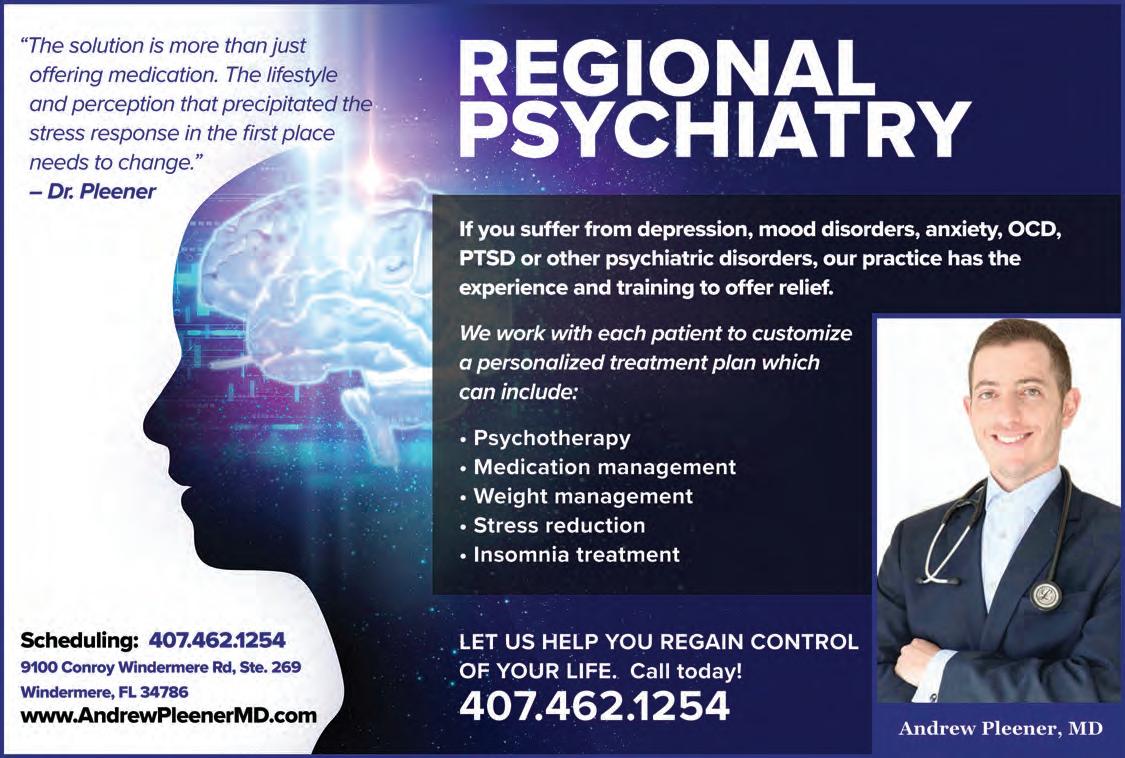
7 minute read
HOW TO HELP TEENS COPE WITH STRESS & LOSS
How to Help Teens
Cope with Stress and Loss
During these stressful times, it’s important for teens to have an outlet for their struggles. Here are some ideas for how parents can help.
By Kelly Gilmore
“W hen a young person might have a first thought of suicide between when they make a suicide attempt, it can be as short as 20 minutes,” says Shana Burgess, director of JoCo Mental Health Center in Kansas City.
This is a sobering statistic. Twenty minutes is the very short and very real time interval between initial thought and action for a young teen struggling with dark thoughts. For two moms, this short interval is a harsh reality, having had lost their two teens to suicide.
A Family Tragedy
BJ Thomas Wilson and Sylvia Harrell are the mothers of Regan Wilson and Chad Harrell, two teens whose lives ended far too early due to internal struggles caused by external pressures. Wilson explains that in December of 2017, her daughter Regan was struggling with immense pressures of passing her CNA exam, while Harrell describes the day her son got into trouble and wasn’t allowed to attend a party, which angered him immensely.
Their lives are honored through #GiveMe20, an initiative that works directly with teens with the mission of preventing tragedies such as these from occurring again.
“The reason I am passionate about #GiveMe20 is because at the end of the day, we’re just two moms who suffered tremendous heartbreak,” Wilson says. “We are rising up from the ashes to try to make a difference.”
What is #GiveMe20?
The #GiveMe20 initiative asks teens to create and decorate a #GiveMe20 box that contains memories and messages that can be used to uplift during a period of dark thoughts as well as contact information as a reminder of who to call for help.
“#GiveMe20 is an opportunity for us to offer them tools, thoughts, memories and dreams to carry them through any dark moments,” Wilson says. “#GiveMe20 started kind of as a pledge asking kids to promise that if they found themselves in a dark moment, that they would step back and focus on reminding themselves about what they have to live for rather than looking for a way to end their life.”
As teens create their boxes, they participate in multiple activities that result in anecdotes and reminders of the good things in their lives. This includes writing down what they love, have to live for and the people they pledge to reach out to during any dark times.
“We are hoping that coupling an in-person class with a box of momentos and cherished items that they can have in their hand will give the kids the tools they need to get through 20 minutes of darkness and find the light,” Harrell says. #GiveMe20 strives to put the proper tools in the hands of teens so they can cope with stress, anxiety and other pressures that can induce dark thoughts. These boxes serve as a reminder of all the wonderful things and people in their life worth living for.
“In about 50% of individuals who attempt suicide, there is not a known mental health condition,” Burgess says. “We need to be very aware of anyone around us and have that connection and outreach with people in order to help and provide support.”


Helping Your Teens Deal with Disappointment
In stressful and uncertain times, such as now during COVID-19, teens are faced with tremendous stress, changes and the loss of many milestones, such as prom or graduation. IMPOWER is a leading non-profit organization that assists those affected by mental health, substance misuse and child wellbeing. In an interview with Judy Charuhas, a mental health counselor from IMPOWER, she discusses how teens can cope with these disappointments and how parents can help.
Q: How can the loss of milestones such as prom or graduation, and the rapid changing of a student’s high school experience, affect the student’s mental health?
A: Milestones are meant to be shared. The loss of acknowledging a goal, such as graduation; the longterm commitment to achieving that goal; recognition for all that is involved in that milestone, such as hard work, perseverance, beating the odds or first in your family to receive a degree are all noteworthy. Loss of milestones and change in structure can show in the symptoms of grief, depression and anxiety. It’s important to note that milestones, when shared, offer a gift of hope, encouragement and shared celebration. Loss of school structure can affect teens. Some teens are adaptable and others are affected by lack of structure, lack of connection.
Q: How can parents help and support their teens with coping?
A: Talk with your teen. Ask open ended questions: What does this mean to you? How do you feel about it? What do you miss the most? What hurts the most right now? What can I do to help you through this? Share a loss you had that can show a connection with this loss and how you felt. It can bring you closer to your teen. It’s important to note not all teens open up with parents. Therapy can be very helpful during this time.
Q: What are your thoughts for both students and parents on processing and explaining feelings?
A: First, I think it’s important to understand this is a loss. Everyone has experienced a loss at one point in their life that they can connect to and empathize with these teens right now. Perhaps it was a breakup, loss of job, death of a family member/ friend/colleague, loss of income, or loss of a location. Loss is grief. We can grieve for the past or the future or the here and now. Grief and depression can share similar symptoms such as sadness, insomnia and appetite issues, or grief can be seen in anxiety symptoms such as lack of focus, constant worry, insomnia or restlessness. All these symptoms are normal symptoms for these experiences. Normal grief symptoms will fade over time; however, if not addressed, grief can become complicated grief. Complicated grief is more intense symptoms over a longer period of time. It’s when the symptoms affect their lives and daily living that mental health guidance should be sought.


Q: What are some tips for students to manage this loss and stay positive?
A: Talk about it, share your feelings. There is an old saying, “Feel, deal, heal.” When we talk about what we are feeling and share those feelings, we begin to deal with the issues and can heal from the pain. To stay positive, ask yourself, “What can we do in the future to acknowledge this? What can we do now?” How about coordinating a virtual prom? Virtual graduation? Make a list of things you are grateful for. One way people heal is to do for others. Some teens are joining a mask sewing group, shopping and delivering groceries for their neighbors, facetiming with the kids they babysit for! Connection is key during this time. At IMPOWER, we have been utilizing telehealth for counseling for over seven years. Our teen clients have that connection with our therapists. We are hearing from our teens that the lack of acknowledging their loss is what creates further disappointment and hurt for them.
We Our Foster Parents Providing Hope to Children and Families in Need

For children and teens without a safe, nurturing environment, the future can seem dark and uncertain. Foster parents provide a gift of a lifetime by opening their home and their hearts. Their ongoing caring commitment is critical for giving children and teens in need a chance at fulfilling their potential and enjoying a life of success.
There is a great need for foster parents in the Central Florida area. Seek out ways you can support children and teens in foster care and assist those who have dedicated themselves to helping those in need.
Devereux Advanced Behavioral Health Florida is currently seeking potential foster parents to provide a stable and caring home for children in need, including survivors of sexual exploitation. Specialized training and ongoing professional support is provided for foster families.










